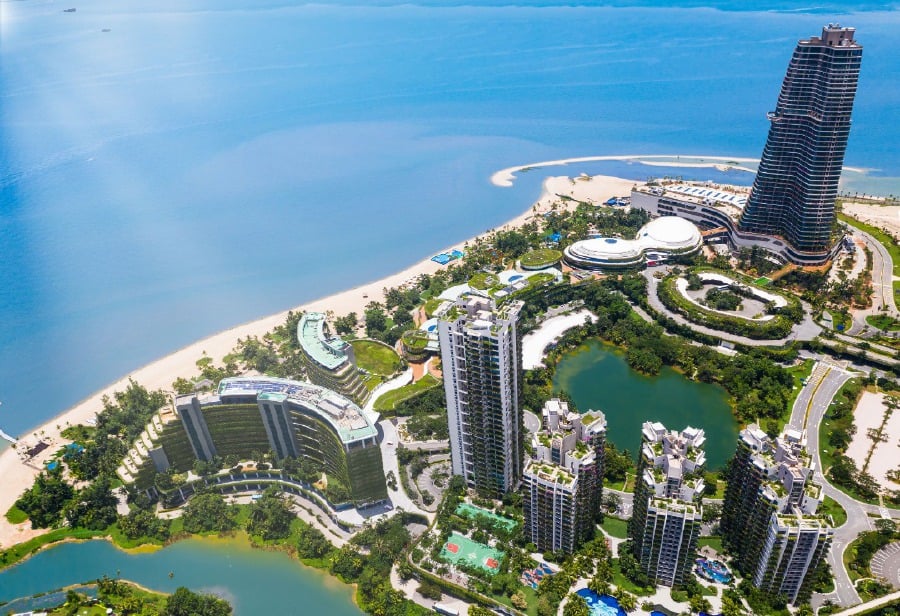03 May 2024 - {{hitsCtrl.values.hits}}
 Malaysia’s Forest City and Cambodia’s Sihanoukville have suffered immensely from China’s property sector crisis. From the half-finished structures of Forest City in Johor, Malaysia, to the desolate shores of Sihanoukville, Cambodia, the narrative of China's real estate giants reflects unbridled ambition and dire consequences. Both locales are now labeled as ghost cities.
Malaysia’s Forest City and Cambodia’s Sihanoukville have suffered immensely from China’s property sector crisis. From the half-finished structures of Forest City in Johor, Malaysia, to the desolate shores of Sihanoukville, Cambodia, the narrative of China's real estate giants reflects unbridled ambition and dire consequences. Both locales are now labeled as ghost cities.
Ghost Cities are abandoned neighborhoods and sometimes entire urban areas constructed but never inhabited, representing the epitome of Chinese overdevelopment in real estate and reliance on housing as an investment avenue.
The property bubble burst in late 2021, triggered by the default of China Evergrande Group, one of the nation’s largest property developers, on a debt totaling $340 billion by the end of 2022. In the same period, another major developer, Country Garden, defaulted on millions of dollars in interest payments linked to two offshore bonds, signaling further distress in the sector.
These events reverberated onto foreign ventures. Forest City, once touted as Southeast Asia's housing pinnacle, now stands deserted. It serves as a haunting testament to the pitfalls of speculative investments and excessive urban planning. Envisioned as a bustling metropolis for hundreds of thousands, the project promised modernity and prosperity but instead yielded desolation and decay. With the burst of the Chinese property bubble, Forest City collapsed like a house of cards, leaving behind a landscape dotted with vacant skyscrapers and abandoned aspirations.
Regrettably, Forest City is just one episode in the broader narrative of China's ghost cities. In Cambodia's Sihanoukville, the departure of Chinese real estate entities has left the coastal resort town strewn with numerous incomplete projects. Once dubbed the "second Macao" amidst the influx of Chinese capital, Sihanoukville now grapples with economic downturn and shattered dreams.
Sihanoukville boasts numerous ghost structures. According to the city government, there are roughly 360 unfinished buildings and approximately 170 completed but unoccupied ones. Situated on the Gulf of Thailand coast, Sihanoukville experienced a boom in the mid-2010s fueled by Chinese investments, aligning with Cambodia's pursuit of economic growth through China's Belt and Road Initiative.
Incidentally, Sihanoukville and Forest City represent only two casualties of China's unrestrained expansion of its real estate behemoths. Their pledges of economic prosperity crumbled amidst the pandemic's global onslaught, leaving behind landscapes scarred by deserted buildings and dashed hopes.
Chinese investors have inundated neighboring Asian nations, exposing them to China's economic fluctuations. Cambodia is not an exception. The debt crisis of Chinese real estate giant Country Garden Holdings spilled over to Malaysia, where the fate of a $100 billion mixed-use development in Johor hangs in uncertainty. Cambodia's heavy reliance on Chinese investments is evident, with approximately 90 percent of the $1.9 billion foreign investments approved in 2022 originating from China.
The poor foresight and planning exhibited by China's real estate firms have not only devastated two ASEAN member nations but also engendered ghost cities within China itself. An article on the Interesting Engineering portal reported approximately 687 cities in China, with the real estate sector accounting for 29 percent of the country’s GDP. Around 20 percent of China's urban housing properties, roughly 65 million units, sit vacant. These "ghost cities" such as Tiandu Cheng, Thames Town, and Binhai sprawl across hundreds of square kilometers, boasting infrastructure, skyscrapers, and public spaces but are significantly underpopulated, with vast unoccupied areas.
The International Monetary Fund has labeled the real estate turmoil a 'historic bust.' In a February 2 report, IMF researchers Henry Hoyle and Sonali Jain-Chandra asserted that the property market can no longer be the primary driver of China's economy, owing to years of overreliance on real estate. Beijing now faces the daunting task of rectifying distressed developers like Evergrande and Country Garden, stabilizing plummeting real estate prices, and charting a sustainable course for the sector.
"Home prices became significantly stretched relative to household incomes in the decade before the pandemic, in part because consumers preferred to invest their considerable savings in real estate given the scarcity of attractive alternative saving options," the IMF researchers remarked.
However, the anticipation of continual price hikes for land and homes spurred overextended borrowing by developers, culminating in a collapse of real estate activities, researchers noted. The prevalence of vacant skyscrapers and desolate urban vistas serves as a stark reminder of the perils of unchecked ambition and speculative investments.
According to the UrbanNext Lexicon website, the presence of Ghost Cities underscores Chinese tendencies toward overdevelopment and reliance on housing as an investment vehicle, rendering areas susceptible to the ramifications of a widespread economic downturn in China.
It is imperative for ASEAN countries, particularly Malaysia and Cambodia, to demand accountability from China's real estate giants. The era of being exploited must cease, and China must comprehend that sovereign nations will not tolerate being manipulated in its pursuit of global dominance.
25 Dec 2024 3 hours ago
25 Dec 2024 3 hours ago
25 Dec 2024 5 hours ago
25 Dec 2024 5 hours ago
25 Dec 2024 6 hours ago